Doha Travel Guide
Doha is the beautiful capital of Qatar and one of the most dynamic cities in the Persian Gulf. Accommodating of foreigners, surprisingly laid-back and renowned for safety, it is a good base from which to explore the rest of the country.
As a cultural and commercial centre, Doha offers plenty to see and do. Topping the list of popular activities is shopping, an obsession fuelled by both mammoth modern malls and exotic traditional markets (souks). Many of the travellers who visit Doha are primarily visiting on business, but the glitzy hotels, quality museums and booming restaurant scene keep everyone entertained.
Doha's modern seaport, busy airport and great infrastructure make it exceedingly accessible to visitors, and Qatar is pouring wealth into an already sophisticated city in order to transform it into a cultural and economic powerhouse to rival the likes of Dubai.
The skyline becomes more impressive and attractive every year, and more and more travellers are discovering the wonders the city has to offer. A stroll along the Doha Corniche, ocean on the one side and glamorous cityscape on the other, should leave nobody in any doubt as to why Doha is emerging as a hugely desirable travel destination.
Things to do in Doha
Doha is a hugely dynamic city that takes its range of sightseeing attractions seriously. Shopping and eating out are extremely worthwhile activities in Doha, where ultramodern malls, glamorous restaurants, and bustling markets called souks combine to offer a melange of traditional and modern food and retail opportunities. A stroll along the Corniche (promenade) at sunset is another must in Doha, allowing travellers to see the glittering coastal city at its best.
Doha has a range of museums and galleries offering respite from the desert heat, some of the most popular include the National Museum and Doha Fort. The Ethnographic Museum and the swords and knives on display at the Weaponry Museum are equally fascinating and offer visitors a glimpse into the history of this proud country. The undisputed gem of Doha's cultural scene, however, is the Museum of Islamic Art.
Some enticing excursions out of the city are made possible by numerous tour operators, with camel rides and racing events and dune boarding good options to explore the stark beauty of the seemingly endless stretch of desert beyond Doha. There are also some interesting smaller coastal cities and towns within easy reach, for those who want a taste of Qatar's more traditional face.
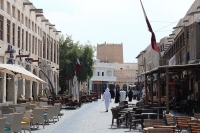
Doha Fort (Al Koot)
Deep in the heart of Doha sits Al Koot, also known simply as the Doha Fort. This Moorish-style relic of military power now exhibits historical photographs and artwork depicting daily life in Qatar, as well as exhibitions detailing many Bedouin Sadu handicrafts and practices, including wooden ornaments, fishing equipment, boat-building, rope-making and gypsum-burning techniques. While some of the examples may be unrefined, they are a true indication of the local people's ability to adapt certain objects and situations to suit their needs.
The fort itself was built in 1880 during the Ottoman occupation. It was originally a military barracks and a police station before being used as a jail from 1906. It is now one of Qatar's most celebrated tourist attractions and visitors should budget at least two hours to take it all in. The fort is located alongside the famous Waqif Souq, a sprawling and fascinating market on Grand Hammad Street which will no doubt also occupy travellers for many hours.
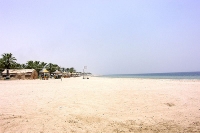
Al Wakrah
On the way to Umm Said lies the town of Al Wakrah, boasting all the charm of a seaside village. Located very close to Doha, Al Wakrah has slowly become a suburb of the big city, but it was historically independent and still retains its unique atmosphere. Local livelihood is still based on pearl diving and fishing in and around the lovely and active harbour area. The Al Wakrah Museum is not to be missed while in town, exhibiting traditional diving equipment, local handicrafts, and treasured antiques. The local fish market is a good bet for fresh seafood; visitors can select their catch and watch it being cooked and prepared for them.
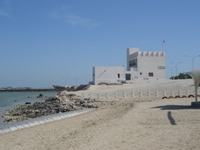
Al Khor Museum
The coastal city of Al Khor lies about 35 miles (57km) north of Doha, within easy reach for travellers wanting a break from the big city. The Al Khor Museum is a double-story building facing the seafront that houses anthropological exhibitions, as well as an excavation section displaying the numerous archaeological discoveries made in the Al Khor vicinity.
Visitors will see artefacts dating back from the Neolithic and Bronze Ages, as well as exhibitions dealing with more modern facets of Qatari culture, such as displays showcasing the area's pearling and dhow-building industries. One of the most interesting exhibitions depicts the myth of Ghilan and Mae, which refers to the region's first female pirate.
A highly recommended tourist activity in Qatar, an excursion to the Al Khor Museum makes for a wonderful introduction to the country's rich cultural history. The city is also home to a number of interesting mosques and some lovely beaches.
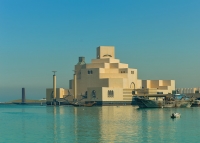
Museum of Islamic Art
Qatar is rapidly making a name for itself in museum development and the gem of the country's cultural offering is Doha's Museum of Islamic Art. The museum houses an exquisite collection of artworks from all over the Islamic world. The pieces on display date from the 7th to the 19th centuries and include glass, ivory, wood, ceramics, textiles, metal, precious stones and manuscripts. The collection housed at the Museum of Islamic Art was sourced from three continents and the building itself was designed by the acclaimed architect I. M. Pei. One of the great cultural assets of Doha, all visitors to Qatar should make a trip to the Museum of Islamic Art as part of their sightseeing itineraries. Visitors should budget at least three hours to soak up all that is on offer.
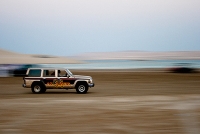
Khor al Adaid (Inland Sea)
Khor al Adaid, also spelled Khawr al Udayd, is a breathtaking and unique geographical area in the southeast of Qatar. The Inland Sea is a tidal lake nestled among the crescent-shaped sand dunes. The shallow body of water has a narrow outlet into the sea and many shore lobes.
It is situated along the border between Qatar and Saudi Arabia, with shores in both countries. The beaches on the Qatar side have become popular with travellers, as have adventure activities in the surrounding dunes.
As Khor Al Adaid is only accessible in 4x4 vehicles, this excursion is usually arranged through tour operators in Qatar. Tour operators offer a range of tours to the Inland Sea, including overnight camps and activities such as camel riding and dune-boarding.
Only drivers who are experienced in driving 4x4 vehicles over dunes should attempt the trip without a tour guide. Even then, they are urged to exercise extreme caution and to let their hotel know where they are going and how long they expect to be gone.
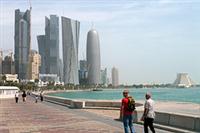
Doha Corniche
The Doha Corniche is a beautiful waterfront promenade and one of the most popular areas in Doha for tourists and locals alike. Now one of the most attractive areas of the city, the Corniche was formed after nearly 15 years of dredging and construction work during the 1970s and 80s. It now extends for several kilometres and connects the West Bay Business District to the south of the city.
The two ends of the Corniche are marked by two of Doha's best tourist attractions for foreign visitors, the Museum of Islamic Art, and the Sheraton Hotel, where visitors can buy alcohol and where parties and live music are often staged.
Although the Doha Corniche used to be a largely empty expanse, the beauty of its seaside location and the groundswell of international commercial activity in Doha has seen extensive development take place. These days, the Corniche sports a glass-and-steel skyline to rival the likes of New York City.
A popular area for joggers, walkers, and bikers, the Corniche is also a wonderful place to gather in the coolness of the evening, to sip some coffee, or to have a meal and socialise with other tourists and Qatari locals while the sun sinks behind the gleaming buildings in the west.

Shisha Bars
A quintessential Arabian pastime and a fun alternative for western visitors to Qatar who are missing their regular nightlife options, shisha bars are where friends gather to sit, chat, and share a smoke of a water-pipe together.
The design of the shisha pipe ensures that even non-smokers should find the experience smooth and comparatively gentle on their lungs, and the tobacco used comes in a variety of delicious flavours such as grape, pineapple, and vanilla.
Visitors should keep in mind that since this is a very traditional recreational activity, women are not allowed into many of the shisha bars in Doha. However, there are some more foreigner-friendly venues which happily allow women in. It's best not to assume women will be welcome and to ask before entering.
A highly recommended tourist activity in Doha, a visit to a traditional shisha bar for some tea and a smoke makes for a great cultural experience, and presents a fantastic opportunity to engage with locals in a relaxed setting.
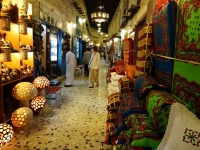
Doha Souks
Doha is world-famous for its collection of souks, which are largely open-air marketplaces selling a wide variety of goods. Shopaholics will feel as though they've died and gone to heaven when perusing Doha's incredible range of souqs, where anything and everything can be bought.
The most famous of Doha's traditional marketplaces is the Souk Waqif ('the Standing Market'), which sells gorgeous traditional garments (including Bedouin cloth), spices, perfumes, handicrafts, and the best range of authentic Qatari souvenirs (such as dullahs and khawas, traditional coffee pots, and small accompanying cups). Souk Waqif also has a fine selection of restaurants and food stalls turning out things such as traditional fare, international cuisine, and a couple of popular shisha bars.
Tourists looking to buy jewellery or gold in Doha should check out the Gold Souk, while those seeking a unique cultural experience should check out the Camel Souk and Falcon Souk (both located in downtown Doha's E-Ring), where you will be amazed at the prices that these magnificent animals can fetch.
Whether visitors are committed shoppers or just eager tourists looking to get to grips with the local culture, Doha's souks are a fine place to spend many hours of their Qatar holiday. Travellers should be prepared to haggle, as this is a normal and accepted part of the shopping experience.
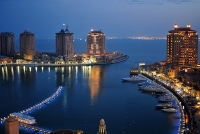
The Pearl–Qatar
The Pearl is a staggering feat of human engineering and one of Doha's hottest new tourist areas. An artificial island located in the West Bay and spanning more than 985 acres (400 hectares), The Pearl is a world-class luxury accommodation and beach resort destination in Qatar. Building the development necessitated the creation of over 20 miles (32km) of new coastline. Of this, 12 miles (19km) consists of pristine sandy beaches.
Expatriate businesspeople in Doha will be interested to know that The Pearl is the first land available for freehold ownership by foreign nationals, as its developers look to foster a lavish, secure Riviera-style community on the man-made island.
The Pearl boasts thousands of permanent residents and has become a massively popular shopping and dining area for well-heeled travellers and Qatari locals alike. Internationally-renowned restaurants are the order of the day at the pearl, while its enormous malls are home to cinemas, theatres and boutique stores stocking every big name brand under the sun.
Getting Around
Doha is home to Doha International Airport, Qatar's only international airport, served regularly by Qatar Airways and in close proximity to the city. Doha also has an excellent road network with new highways being developed to further improve access to the metropole.
There is an extensive bus system and good taxi services in place in and around the city. The city also has a metro system that recently opened. Doha Port is located just off the Doha Corniche and also provides access to the city.
Doha Climate and Weather
Doha's desert climate has year-round hot, sunny weather with very little rainfall. Winters (December to March) are marginally cooler with average lows of 54F (12C), and there is more chance of rain. Summer temperatures (April to November) can rise as high as 104F (40C) and above. The best time to visit Doha is between November and March, when daytime temperatures are at their most merciful, and the threat of sand storms is low.
Qatar travel info
Electricity
The electrical current is 240 volts, 50Hz. Round pin plugs with grounding as well as rectangular blade plugs are in use.
Language
Arabic is the official language, but English is widely spoken.
Money
The official currency is the Qatari riyal (QAR), which divides into 100 dirhams. Money can be exchanged at banks, the airport and exchange dealers. Banks are generally open Saturday to Thursday 7:30am to 1pm, and ATMs are widespread. All major credit cards are widely accepted.
Tipping
A service charge of 10 percent is usually added to hotel and restaurant bills in Qatar, though many people add a bit extra for exceptional service. If there is no service charge, a 10 to 15 percent tip is appreciated. Taxi drivers do not expect a tip but it is polite to round up the fare.
Health
All eligible travellers should be up to date with their COVID-19 vaccines, and it is recommended that visitors be up to date with routine vaccinations such as MMR (measles, mumps, rubella) and tetanus-diphtheria. Vaccinations are also recommended for hepatitis A and hepatitis B. Emergency medical treatment is excellent in the big cities but can be expensive, so travellers are advised to hold comprehensive medical insurance.
Safety
Crime levels are low in Qatar but, like most countries in the Gulf Region, it is rated as being under high threat of indiscriminate terrorist attacks against western interests. Visitors should be vigilant in public places. As a precaution, women are advised to take care when travelling alone at night.
Local customs
Qatar is an Islamic state, which prohibits drinking alcohol in public other than at licensed hotel restaurants and bars. Religious customs should be respected, particularly during the month of Ramadan when eating, drinking, and smoking in public are forbidden by Muslim Law. Intimacy between men and women in public can lead to arrest and homosexuality is illegal.
Visitors should dress modestly and respect local customs. Women should cover their shoulders and avoid wearing shorts or short skirts. The right hand should be used for everything, including eating and the giving and receiving of things, as the left is considered unclean. The import of pornographic material, non-Islamic religious material, alcohol, or pork products is strictly prohibited.
Doing business
Since a large portion of Qatar's population is comprised of foreign nationals, foreigners might find themselves dealing exclusively with other expats in a corporate milieu that they are familiar with. For those who will work within Arabic business culture, it is important to bear in mind that Qatar is an Islamic country, and that visitors should always remain sensitive and respectful of the large influence that these religious beliefs have on ordinary social life.
The business culture of Qatar can be described as 'typically Arabic', in that a great emphasis is placed on personal relationships between business associates. Qatari businessmen prefer to do business with people they are familiar with and who they feel they can trust.
For this reason, foreigners will probably be required to engage the services of a local agent (or sponsor) in Qatar, who'll be able to provide them with important introductions and recommendations. The start of a professional relationship will often be dedicated to getting to know each other and business itself may be slow to start. Foreigners shouldn't get impatient: long-term, personal business relationships in Qatar are certainly worth the investment of their time and energy.
The management style that predominates in Qatar is strictly hierarchical. Decisions are made at the top level and clear, direct instructions are given to staff who are expected to follow them to the letter. It is unusual to hear the word 'no' outright in Qatar. A more polite, indirect method of refusal is usually preferred.
Business etiquette in Qatar reflects the close relationship between personal and professional life, despite the hierarchical structures. Foreigners should use Arabic titles where appropriate, such as Haji and Sheikh, to indicate their respect for their associates. They should make sure that, when discussing business, they can deliver everything they promise, as verbal commitments are treated as solemnly as written contracts in Qatar.
Business meetings in Qatar will most likely be lengthy, and subject to numerous personal digressions, and perhaps even unexpected visitors. It is important to remain patient, even if the meeting's agenda is abandoned. Foreigners should not resort to hard-sell tactics, as this may well be interpreted as aggression.
Visiting business people should not publicly criticise or undermine any associates. If they feel the need to say something, it's best to do so in private. It is common to exchange business cards when meeting new associates for the first time. Foreigners must make sure their details are printed in Arabic on the reverse side of their card and always spend a little time regarding someone else's card before putting it away.
Business dress is smart, formal, and conservative, especially for women, who must take care not to wear anything too revealing. The official language of Qatar is Arabic, though English is widely spoken and widely understood in the business world.
Business hours are generally 7.30am (or 8am) to about 6pm. Friday is a day of rest and most companies will also give either Thursday or Saturday off; international companies tend to favour closure on Saturday.
Duty free
Travellers to Qatar do not have to pay duty on 400 cigarettes and personal gifts and items up to the value of 3000 QAR. Alcohol may not be imported under any circumstances. Travellers are also prohibited from importing pork-related products and pornographic or sexually explicit material.
Communications
The international access code for Qatar is +974. Hotels and cafes offering free WiFi are widely available. As international roaming costs can be high, purchasing a local prepaid SIM card can be a cheaper option.
Passport & Visa
Visitors should have tickets and documents for return or onward travel, and sufficient funds to cover their stay. If on a tourist visa, visitors should have proof of a confirmed hotel reservation and sufficient funds or a credit card. If holding a visa for Oman, an additional visa for Qatar is not required, though travellers are not allowed to depart to a third country. The government of Qatar does not accept temporary passports.
All visitors travelling to Qatar aged 6 and above regardless of vaccination status must bring a PCR test certificate with a negative result valid for 48 hours, or a Rapid Antigen test certificate valid for 24 hours ahead of the scheduled departure time of the flight to Qatar. A Rapid Antigen self-test will not be considered valid for travel.
It is highly recommended that travellers' passports have at least six months' validity remaining after the intended date of departure from their travel destination. Immigration officials often apply different rules to those stated by travel agents and official sources.
Entry requirements
United States citizens require a passport that is valid for six months beyond their date of arrival. No visa is required for a maximum stay of 30 days, and the period can be extended for another 30 days.
Passports must be valid for a minimum of 6 months from the arrival date. British citizens do not require a visa for a maximum of 30 days and can apply to extend their stay another 30 days.
Canadian citizens must have passports valid for a minimum of three months beyond date of arrival. Nationals of Canada do not require a visa for a maximum of 30 days. They can apply to extend their stay another 30 days.
Passports must be valid for a minimum of six months after travellers plan to leave the country. Australians citizens do not require a visa for stays up to 30 days. They can apply to extend their stay for another 30 days.
Passports must be valid for a minimum of six months from date of arrival. South Africans citizens do not require a visa for stays up to 30 days. They can apply to extend their stay for another 30 days.
Irish citizens must have a passport valid for six months from the arrival date. Nationals of Ireland do not require a visa for a maximim of 30 days. They can apply to extend their stay for another 30 days.
Passports must be valid for a minimum of six months from the arrival date. New Zealanders do not require a visa for stays up to 30 days. They can apply to extend their stay for another 30 days.
Useful contacts
Qatar National Tourism Council: www.visitqatar.qa/
Emergencies: 999.


